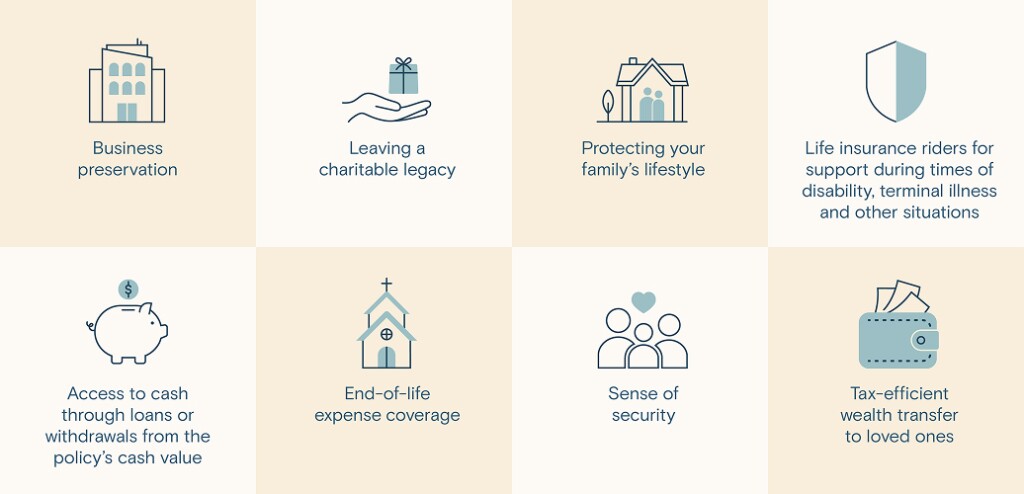From vacations to college dreams, creating life plans with loved ones is one of the many joys in life. But when it comes to more sensitive topics, like unexpected death, it can be tempting to avoid conversations altogether.
Initiating a conversation about your family values and goals—and how those goals could be impacted by the death of a loved one—can help you think through key details of your legacy plan and provide some comfort for everyone.
Self-reflection: Questions to ask yourself
Before you bring the conversation about life insurance to your loved ones, think about how life might look when you're not there.
"When you think about your life insurance needs, it starts with self-reflection," says Todd Yeiter, director of advisor support at Thrivent. "Who do I want to be present for? Who's important to me? When you consider these, life insurance can make a significant difference, and you can evaluate the connection between its price and its impact."
Who do I want to be present for? Who's important to me? When you consider these, life insurance can make a significant difference, and you can evaluate the connection between its price and its impact.
We find it helps to think about your priorities in five categories:
1. What are your family's immediate needs should you die?
Think of these as your urgent funds, or the cash your loved ones will need to pay off your debt and pay bills. This is also the “mourning time” funds, or the means to allow your loved ones the time to properly grieve without worrying about expenses.
"Life insurance can provide transition time to mourn. That matters," says Yeiter.
This also can include funeral expenses and other expenses your family may need while handling your affairs.
- Who will be handling my affairs? Do I want to have a funeral—what will that involve? What will those expenses be?
- If I were to die tomorrow, how much debt would I be leaving behind? What plans can I put in place to relieve that debt faster now and in the future?
- How long do I want to relieve my family of their financial responsibilities so they can properly grieve (1 month, 3 months, a year)?
2. How would my family be impacted without my income?
Who depends on you for daily income and expenses? Your income is likely tied to your ability to work. If you die or become unable to work, understanding your family's needs, and how much they rely on your income to meet those needs, is the most fundamental consideration as you calculate
- How many dependents do I have? (Dependent income is often for immediate family, but you may have other individuals or even organizations that depend on you.)
- How long will my dependents need to rely on my income after I'm gone?
3. How do I plan to contribute to education?
Education can be a complex (and expensive) topic. And it's possible that your plans for how you want to support others' education goals could look different today than if you were to die.
- Do I want to pay for my kids' college education?
- Do I want my kids to pay for part of their education? (Maybe today you want your kids to pay for part of their education, but if you would die, you'd prefer to relieve them of that burden and pay for their education in full.)
- Do I have other dependents or loved ones with educational or vocational goals I plan to fund (godchildren, nieces and nephews, spouse)?
4. What kind of legacy do I want to leave?
Giving regular gifts to charities, organizations and loved ones may be an essential part of who you are—and you can continue making an impact in people's lives after you're gone.
"If something happens, I'd like my family to do something significant, like make a sizeable donation to a cause important to me. It's not just about income replacement, it's about showing my legacy in a meaningful way." says Yeiter.
- How much do I give to charities and community organizations now? Do I want that to increase, decrease or stay the same?
- Who would I like to give a lump sum gift to? How often and how much?
- Is it important for me to create sources of
generational wealth for my family?
5. What traditions or life events do I want to be sure are supported?
How would you like to be present for your family and community on a bigger level? Consider the life events you would want to be present for. Maybe you want to pay for your grandchild's wedding or fund the next family reunion. Or maybe you want to continue giving an annual gift to your nieces and nephews until they graduate. If there are family traditions you'd like to be carried out after you're gone, consider how you may be able to support those traditions moving forward.
- What family traditions do I cherish and wish to support in the future?
- Is there anyone I would like to give a personal gift to in the future?
- What life events would I like to fund for my descendants (weddings, baby showers, first homes)?

The living benefits of permanent life insurance
A conversation guide for your family
This topic can be sensitive for your loved ones. However, with the right prompting, you can ensure you're making financial decisions together that hold true to your family values and goals.
Who should be involved in a life insurance conversation?
Once you've given yourself plenty of time to think through your priorities and plans, bring your loved ones into the conversation. Talking to your family about these topics may be sensitive and uncomfortable, but they are necessary for planning.
- Your spouse/partner. It may be helpful to include your spouse or partner in the initial thinking as you consider your priorities as well as their needs or requests. They may have a perspective you haven't yet considered, as they are also likely to be the most directly impacted by your death.
- Your family (parents, kids and other dependents). Bring your family into the conversation to hear their perspectives and share your plans. Even if they don't influence any of the decisions, including them in the conversation can help them better understand your wishes, priorities and plans for caring for them.
Questions to start an open dialogue:
- How will your family be impacted emotionally by your death?
- Could your family sustain their quality of life without you/your income?
- What would need to change in the event that you passed?
- Would life insurance help to alleviate the financial and emotional aftermath of the tragedy?
- What do your young adult and adult children have to say about your plans?
These conversations can lead to a level of relief and a sense of reassurance that can help you create a real strategy for a crisis.
How much life insurance will you need?
Understanding how much insurance coverage you need entirely depends on your personal situation. A great start is answering the questions above. Once you think through your priorities and how much it will cost to cover those priorities for years to come, you'll have a better ballpark number for your coverage needs. For maximum security, make sure your benefit covers:
- Payoffs of debt (mortgage, credit cards, loans)
- College costs
- Charitable bequests
- Family's core needs
Once these core needs are met, you can invest time in educating your family on what they will need to do if you would die. And you can begin thinking about how you could support your community.

Calculate your life insurance needs
Get professional guidance
The life you’ve built is worth protecting. Find coverage that supports loved ones after you're gone. A
You also can get started by







